Portuguese fuel-tanker drivers' national strike begins as scheduled
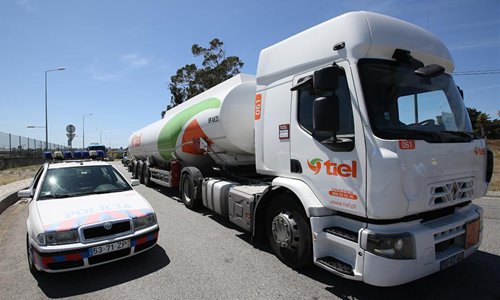
Police escort a fuel-tanker arriving at the Humberto Delgado Airport in Lisbon, Portugal, on Aug. 12, 2019. Portuguese fuel-tanker drivers' national strike began as scheduled since Monday for an indefinite period. Portugal's government has ordered minimum services of between 50 percent and 100 percent and has declared an energy crisis, which implies "exceptional measures" to minimize the effects of strike to ensure the provision of essential services such as security forces and medical emergencies. (Photo by Pedro Fiuza/Xinhua)
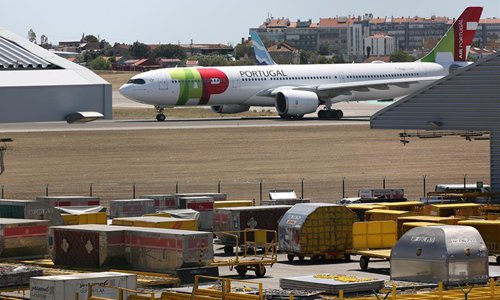
An airplane prepares to take off at the Humberto Delgado Airport in Lisbon, Portugal, on Aug. 12, 2019. Portuguese fuel-tanker drivers' national strike began as scheduled since Monday for an indefinite period. Portugal's government has ordered minimum services of between 50 percent and 100 percent and has declared an energy crisis, which implies "exceptional measures" to minimize the effects of strike to ensure the provision of essential services such as security forces and medical emergencies. (Photo by Pedro Fiuza/Xinhua)
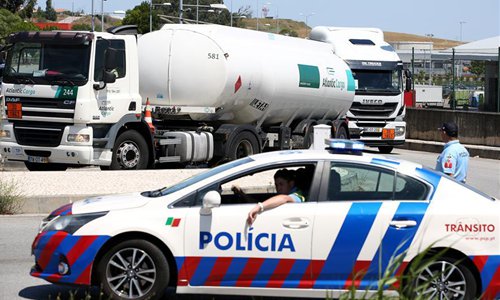
Police officers escort fuel-tankers leaving the Humberto Delgado Airport in Lisbon, Portugal, on Aug. 12, 2019. Portuguese fuel-tanker drivers' national strike began as scheduled since Monday for an indefinite period. Portugal's government has ordered minimum services of between 50 percent and 100 percent and has declared an energy crisis, which implies "exceptional measures" to minimize the effects of strike to ensure the provision of essential services such as security forces and medical emergencies. (Photo by Pedro Fiuza/Xinhua)
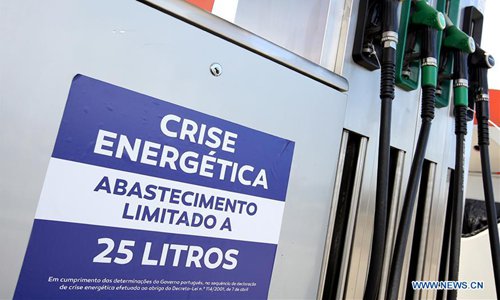
A sign reading "Energy Crisis-Supply Limited to 25 Liters" is pictured at a gas station in Lisbon, Portugal, on Aug. 12, 2019. Portuguese fuel-tanker drivers' national strike began as scheduled since Monday for an indefinite period. Portugal's government has ordered minimum services of between 50 percent and 100 percent and has declared an energy crisis, which implies "exceptional measures" to minimize the effects of strike to ensure the provision of essential services such as security forces and medical emergencies. (Photo by Pedro Fiuza/Xinhua)
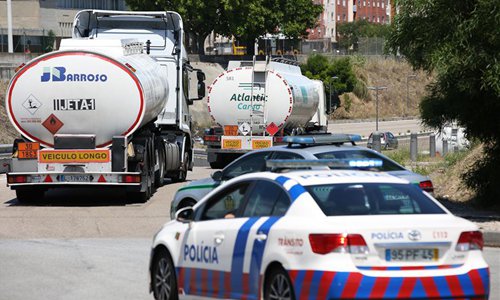
Police escort fuel-tankers leaving the Humberto Delgado Airport in Lisbon, Portugal, on Aug. 12, 2019. Portuguese fuel-tanker drivers' national strike began as scheduled since Monday for an indefinite period. Portugal's government has ordered minimum services of between 50 percent and 100 percent and has declared an energy crisis, which implies "exceptional measures" to minimize the effects of strike to ensure the provision of essential services such as security forces and medical emergencies. (Photo by Pedro Fiuza/Xinhua)
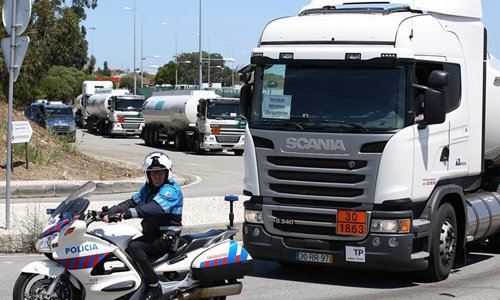
A police officer escorts fuel-tankers leaving the Humberto Delgado Airport in Lisbon, Portugal, on Aug. 12, 2019. Portuguese fuel-tanker drivers' national strike began as scheduled since Monday for an indefinite period. Portugal's government has ordered minimum services of between 50 percent and 100 percent and has declared an energy crisis, which implies "exceptional measures" to minimize the effects of strike to ensure the provision of essential services such as security forces and medical emergencies. (Photo by Pedro Fiuza/Xinhua)
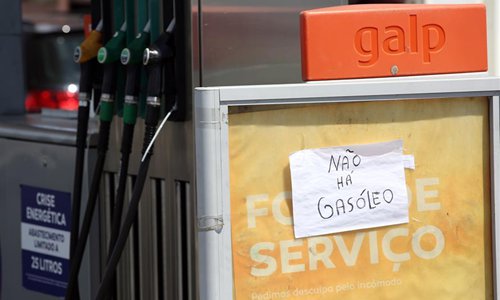
A sign reading "No Diesel" is pictured at a gas station in Lisbon, Portugal, on Aug. 12, 2019. Portuguese fuel-tanker drivers' national strike began as scheduled since Monday for an indefinite period. Portugal's government has ordered minimum services of between 50 percent and 100 percent and has declared an energy crisis, which implies "exceptional measures" to minimize the effects of strike to ensure the provision of essential services such as security forces and medical emergencies. (Photo by Pedro Fiuza/Xinhua)
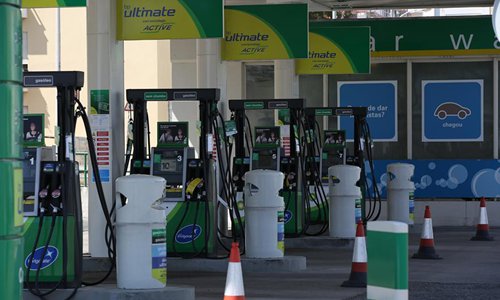
A closed gas station is pictured during a strike in Lisbon, Portugal, on Aug. 12, 2019. Portuguese fuel-tanker drivers' national strike began as scheduled since Monday for an indefinite period. Portugal's government has ordered minimum services of between 50 percent and 100 percent and has declared an energy crisis, which implies "exceptional measures" to minimize the effects of strike to ensure the provision of essential services such as security forces and medical emergencies. (Photo by Pedro Fiuza/Xinhua)
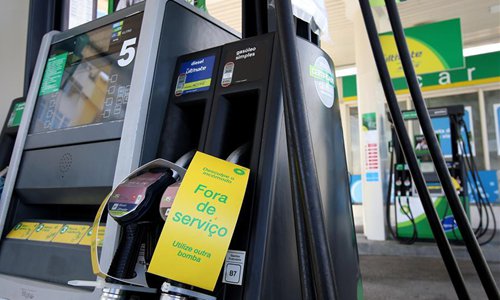
A closed gas station is pictured during a strike in Lisbon, Portugal, on Aug. 12, 2019. Portuguese fuel-tanker drivers' national strike began as scheduled since Monday for an indefinite period. Portugal's government has ordered minimum services of between 50 percent and 100 percent and has declared an energy crisis, which implies "exceptional measures" to minimize the effects of strike to ensure the provision of essential services such as security forces and medical emergencies. (Photo by Pedro Fiuza/Xinhua)
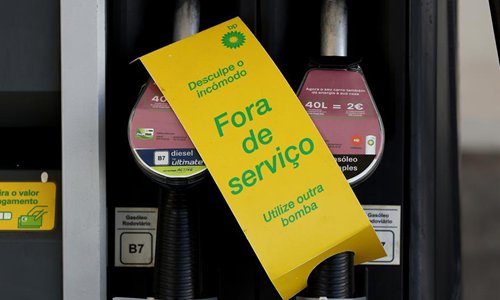
A sign reading "Out of Service" is attached to pumps at a gas station in Lisbon, Portugal, on Aug. 12, 2019. Portuguese fuel-tanker drivers' national strike began as scheduled since Monday for an indefinite period. Portugal's government has ordered minimum services of between 50 percent and 100 percent and has declared an energy crisis, which implies "exceptional measures" to minimize the effects of strike to ensure the provision of essential services such as security forces and medical emergencies. (Photo by Pedro Fiuza/Xinhua)
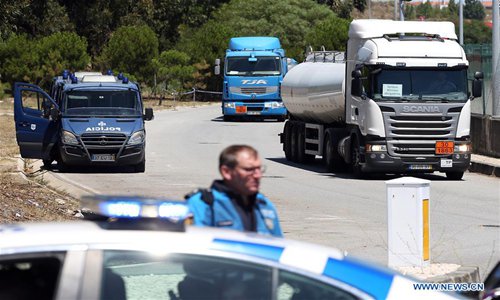
A police officer escorts fuel-tankers leaving the Humberto Delgado Airport in Lisbon, Portugal, on Aug. 12, 2019. Portuguese fuel-tanker drivers' national strike began as scheduled since Monday for an indefinite period. Portugal's government has ordered minimum services of between 50 percent and 100 percent and has declared an energy crisis, which implies "exceptional measures" to minimize the effects of strike to ensure the provision of essential services such as security forces and medical emergencies. (Photo by Pedro Fiuza/Xinhua)